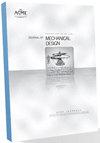Agent-Based Product-Social-Impact-Modeling: A Systematic Literature Review and Modeling Process
IF 3
3区 工程技术
Q2 ENGINEERING, MECHANICAL
引用次数: 0
Abstract
A key part of an engineer's purpose is to create products and services that benefit society, or, in other words, to create products with a positive social impact. While engineers have many predictive models to aid in making design decisions about the functional performance or safety of a product, very few models exist for estimating or planning for the wide range of social impacts an engineered product can have. To model social impact, a model must contain representations of both the product and society. Agent-based modeling is a tool that can model society and incorporate social impact factors. In this paper, we investigate factors that have historically limited the usefulness of product adoption agent-based models and predictive social impact models through a systematic literature review. Common themes of limiting factors are identified, steps are presented to improve the usefulness of agent-based product adoption models and predictive social impact models, and a general process for the creation of agent-based social impact models is presented. Improving the usefulness of these predictive models can aid engineers in making better design decisions. Predictive social impact models can help identify areas in the design space to improve the social impact of products. When coupled with existing design methods, agent-based predictive social impact models can help increase the probability that a product achieves positive social impact.基于主体的产品-社会-影响模型:系统文献综述与建模过程
工程师目标的一个关键部分是创造有利于社会的产品和服务,或者换句话说,创造具有积极社会影响的产品。虽然工程师们有许多预测模型来帮助制定有关产品功能性能或安全性的设计决策,但很少有模型用于估计或规划工程产品可能产生的广泛的社会影响。为了对社会影响进行建模,模型必须同时包含产品和社会的表示。基于主体的建模是一种可以对社会进行建模并纳入社会影响因素的工具。在本文中,我们通过系统的文献综述,研究了历史上限制了基于代理的产品采用模型和预测社会影响模型的有效性的因素。确定了限制因素的共同主题,提出了提高基于代理的产品采用模型和预测社会影响模型的有用性的步骤,并提出了创建基于代理的社会影响模型的一般过程。提高这些预测模型的实用性可以帮助工程师做出更好的设计决策。预测社会影响模型可以帮助确定设计空间中的区域,以改善产品的社会影响。当与现有的设计方法相结合时,基于主体的预测社会影响模型可以帮助提高产品实现积极社会影响的概率。
本文章由计算机程序翻译,如有差异,请以英文原文为准。
求助全文
约1分钟内获得全文
求助全文
来源期刊

Journal of Mechanical Design
工程技术-工程:机械
CiteScore
8.00
自引率
18.20%
发文量
139
审稿时长
3.9 months
期刊介绍:
The Journal of Mechanical Design (JMD) serves the broad design community as the venue for scholarly, archival research in all aspects of the design activity with emphasis on design synthesis. JMD has traditionally served the ASME Design Engineering Division and its technical committees, but it welcomes contributions from all areas of design with emphasis on synthesis. JMD communicates original contributions, primarily in the form of research articles of considerable depth, but also technical briefs, design innovation papers, book reviews, and editorials.
Scope: The Journal of Mechanical Design (JMD) serves the broad design community as the venue for scholarly, archival research in all aspects of the design activity with emphasis on design synthesis. JMD has traditionally served the ASME Design Engineering Division and its technical committees, but it welcomes contributions from all areas of design with emphasis on synthesis. JMD communicates original contributions, primarily in the form of research articles of considerable depth, but also technical briefs, design innovation papers, book reviews, and editorials.
 求助内容:
求助内容: 应助结果提醒方式:
应助结果提醒方式:


